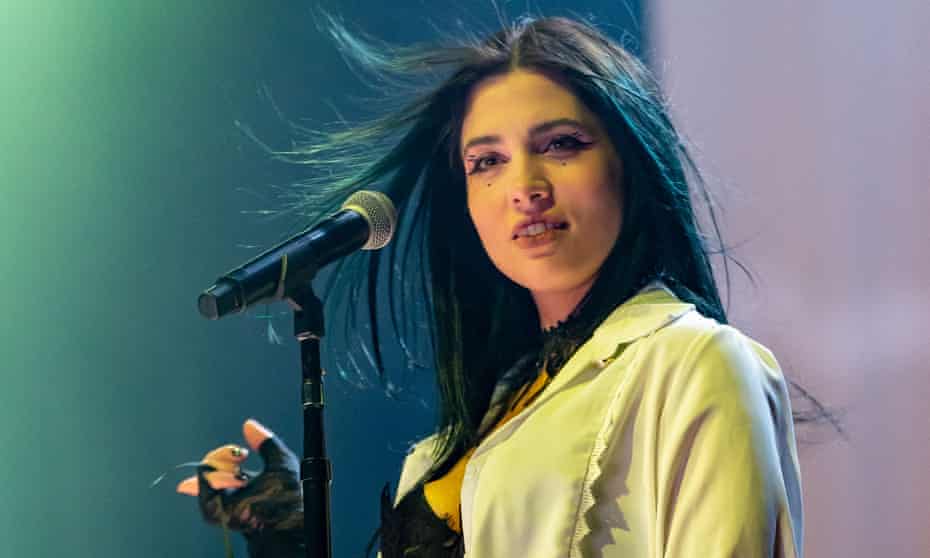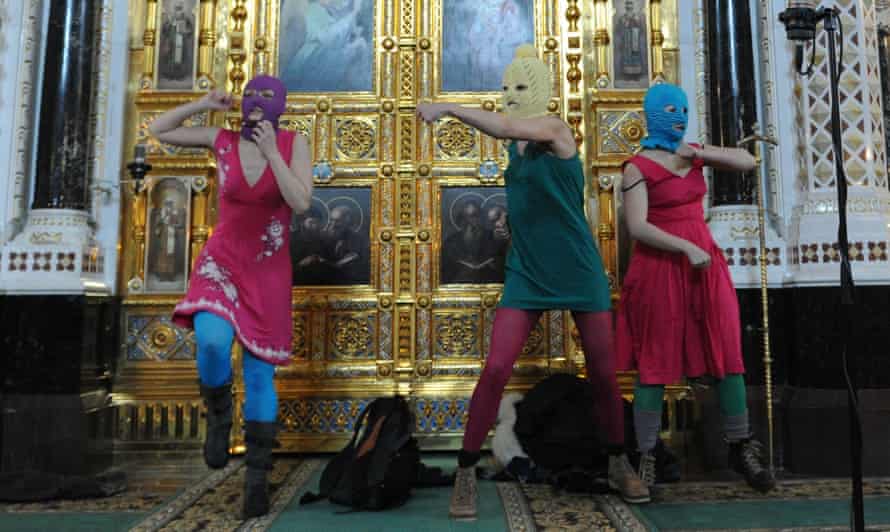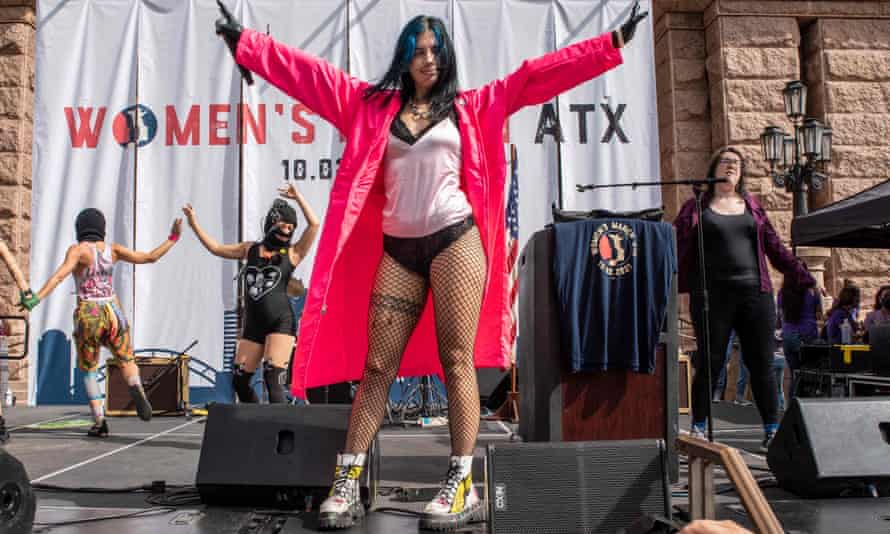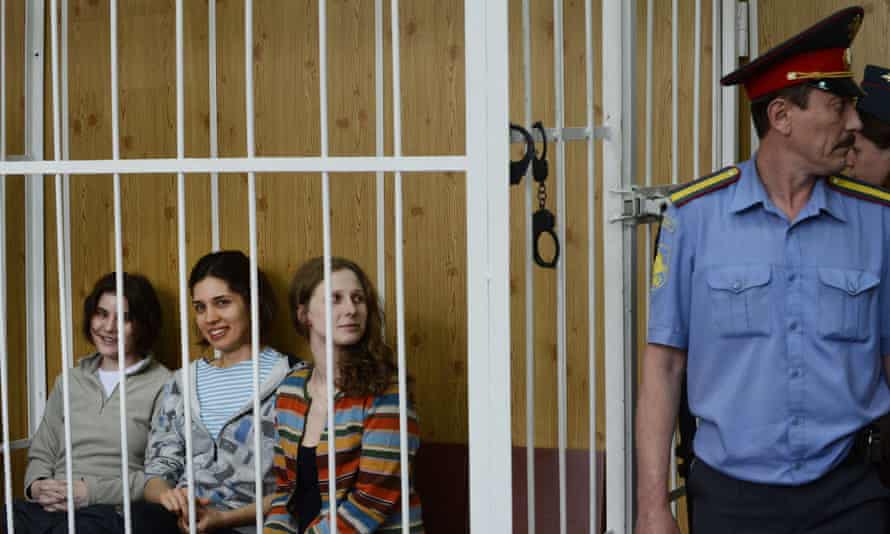The Guardian – Interview
Pussy Riot’s Nadya Tolokonnikova: ‘You cannot play nice with Putin. He is insane. He might open fire on his own people’
Zoe Williams – March 8, 2022
The Russian artist – who spent two years in a Siberian jail for singing an anti-Putin ‘punk prayer’ – is using NFTs to fight the dictator, raising $7m in five days. At a time like this, she says, only activism will keep you sane

Nadya Tolokonnikova is in a geographically undisclosed location, speaking to me by Zoom, in a Pussy Riot T-shirt, looking purposeful, driven and singleminded. Her feminist protest art has been deadly serious since its inception, when she founded Pussy Riot in 2011. The watching world may have been entertained by its playful notes, the guerrilla gigs in unauthorised places, culminating in the event for which she was prosecuted, in Moscow’s Cathedral of Christ the Saviour, when she sang Punk Prayer: Mother of God, Drive Putin Away.
But the consequences have always been seismic and severe. Tolokonnikova, along with two other members of Pussy Riot, were sentenced to two years in prison for hooliganism in 2012, separated from their very young children, went on hunger strike, endured unimaginably harsh conditions and were named prisoners of conscience by Amnesty International.
Tolokonnikova is “nomadic by nature”, she says. “This planet is my home. I’ve always been an anarchist. I’m not really a big fan of borders or nation states.” But beneath those abstracts there exist concrete dangers. She was declared a “foreign agent” by the Kremlin in December, as was the independent news outlet she founded upon her release from prison, Mediazone.

“Putin just signed a law that said you’re going to get 15 years in jail for even discussing the war in Ukraine,” she says matter-of-factly. “You cannot even call it a war, you have to call it a special military operation.” The jeopardy of being a known Russian dissident is greater now than it has been in decades, and nobody understands that more keenly than Tolokonnikova, who was born in 1989, too young to remember Perestroika.
Yet her focus is anything but self-protective. When Putin invaded Ukraine on 24 February, she and various collaborators from the world of cryptocurrency launched the Ukraine DAO (decentralised autonomous organisation). It was a 1/1 NFT of the Ukrainian flag, and the group invited people to bid for collective ownership of the image, raising $7.1m in five days.
“We felt, me and my friends in crypto, that we had to react somehow. I’m personally convinced that in situations like this, activism is the only thing that can keep you sane. Just looking at disasters and tragedies and not doing anything about it is really detrimental for the world, but also it slowly destroys you and makes you feel helpless.” The money has already been distributed to the organisation Come Back Alive, which has been mobilising support for the Ukrainian army since 2014 with medical care, ammunition, training and defence analytics.
I was ready to die. If you fight with a dictator, you have to show them that you are ready to fight to the end
Tolokonnikova is devastated by the invasion of Ukraine. “I’m in a panic, I’m crying every day. I don’t think it was in any sense necessary, I don’t think it was in any sense logical. It wasn’t something that had to happen, it’s a disaster that will end thousands of people’s lives. I’m freaking out.” Yet she never had the luxury of complacency about what Putin was capable of. “The global community was extremely complacent, and I see two reasons: hypocrisy, based on greed. People would make statements that they did not support Putin’s politics, and his oppression of the political opposition, and the wars that he started – this isn’t the first war by any means. But at the same time they would continue doing business with him.” Nobody was interested in following the money; asking how the oligarchs coming out of Russia, fetching up in Europe and Miami, had come upon their vast wealth.
“Stupidity,” she continues, bluntly: “this is the second reason. People underestimate how dangerous dictators are. In 2014, we spoke to the UK parliament, we spoke at the Senate in the US, we were asked by a lot of people how they should talk to Putin, how they should frame the conversation, and I always advised that they should be as strict as they could. You cannot play nice with Putin.” This wisdom was won, not so much by her arrest for offending the thin-skinned leader but during her time in prison. “Dictators act a lot like prison wardens. They treat kindness as weakness.”

Both during her sentence and following her release in 2014, Tolokonnikova campaigned in ways that political prisoners throughout history would recognise. First, with a hunger strike. “Starting that, I was pretty much ready to die. If you fight with a dictator, you have to show them that you are ready to fight to the end. I think this is why Ukraine is actually winning: they might lose some cities but they’re willing to fight to the end, and that is not the case for the Russian army.”
She gained support worldwide, and from figures such as Madonna and Hillary Clinton. She began to exchange letters with Slavoj Žižek which were subsequently turned into a book, Comradely Greetings. What she remembers now, though, was the concrete impact on prison conditions. A week into her hunger strike, Putin’s right-hand man on human rights called her personally, in prison, to discuss the brutal conditions she was protesting against: 18 hour days of labour with only one day off every six weeks; very little sleep; horrific violence at the hands of guards and other inmates.
“This was fairly insane. I was the lowest person on the social ladder, and he had to call me.” Later, the prison director and architect of this slave labour system, Yury Kupriyanov, was convicted for it and served a suspended two-year sentence, and the Russian correctional headquarters “had to make a statement. They named me, and said I was right.”
Everything I’m doing is to be a greater pain in the arse to Putin
Tolokonnikova’s sentence left its mark: “I was traumatised by prison. I was barely functional when I got released. I suffered from a really severe depression in 2014. I’m still on medication for depression caused by PTSD.” The daughter from whom she was separated by incarceration is now 14; “she’s a social democrat,” Tolokonnikova says approvingly, if a bit wryly. “She says that in her generation, people want greater equality.”
Her experience hasn’t blunted her activism, which is now concentrated at the frontier of technological possibility. She originally thought cryptocurrencies were just a toy for rich techies but their potential for activists – being independent of central banks and governments, immune to corporate takeover – dawned on her in early 2021, and since that time she has raised: “quite substantial sums for different charitable causes. We raised money for a shelter for victims of domestic violence. We were able to move dozens of women from a really dangerous place in Russia, outside of Russia. We raised money in August of last year for political prisoners in Russia.”
Besides that, today she is helping launch the UnicornDAO, a crypto fund whose mission is to buy artworks from female and LGBTQ+ artists. “It’s not going to be just buying up their works of art; we’re going to be working with them, helping them in various ways to have stable and sustainable careers.” Unicorn’s first purchase was by the Russian-born, New York-based artist Olive Allen.

“I feel like the NFT world is a great way to redistribute money,” Tolokonnikova says, “but we see these old patterns being repeated. Misogyny doesn’t go anywhere, it just migrates over to digital artwork. Women account for only five per cent of all NFT sales. It’s so much more difficult to prove there is value in your words if you happen to be a woman.”
These explorations in crypto can sound mercurial, one minute driving cultural change, the next raising money, the next trying to create democratic agency independent of nation states – and it’s by no means clear what that would look like – but Tolokonnikova’s reading of Russian politics, and what it would take to force change, is entirely practical. It would take “a mass uprising, millions of people coming to the streets and refusing to leave until Putin is gone. That is obviously incredibly dangerous. Putin is insane, so he might open fire at his own people. I definitely understand why everybody is not already on the streets.”
Alongside that, “another force of change may come from Putin’s closet circle. I honestly think Putin is digging his own grave now. The number of oligarchs who are close to him who have publicly supported Ukraine, and are standing against the war, is significant, and that hasn’t happened in 20 years.”
She sees a worthy successor to Putin in opposition leader Alexei Navalny. “Better social programes, and redistribution, that’s all part of his programe. I’ve known him since 2007 – it has been really interesting to witness his platform become more and more social democratic, even though he doesn’t describe himself as that. He doesn’t use labels. I think it’s smart. He doesn’t want to divide people.” And as she recalls her own time in prison, Tolokonnikova urges the world not to forget that Navalny still languishes in jail. Her own work, specifically the UnicornDAO, “is not connected to Putin directly anyhow. But everything I’m doing is to be a greater pain in the arse to Putin, because it’s so personal to me.”
